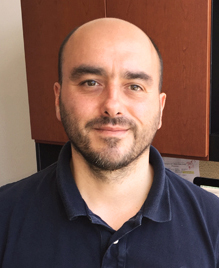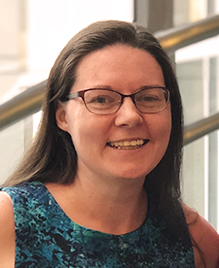HOW CAN WE HELP YOU? Call 1-800-TRY-CHOP
In This Section
BWF Awards Recognize Young Investigators, Innovative Research
 Our future breakthroughs begin when scientists who are early in their careers receive support from the scientific community. Last month, the Burroughs Wellcome Fund (BWF) recognized three scientists at Children’s Hospital of Philadelphia for their outstanding early career work with a trio of highly competitive awards. BWF, an independent foundation dedicated to advancing the biomedical sciences, granted the Investigators in the Pathogenesis of Infectious Disease (PATH) Award to Jorge Henao-Mejia, MD, PhD, assistant professor of Pathology and Laboratory Medicine at CHOP, and the Career Award for Medical Scientists (CAMS) to Elizabeth Bhoj, MD, PhD, clinician-researcher in the Division of Human Genetics, and Sarah Henrickson, MD, PhD, an attending physician and instructor in the Division of Allergy and Immunology at CHOP. Together, the receipt of these awards highlights the strength of our junior faculty as they continue to build impactful and independent research careers.
Our future breakthroughs begin when scientists who are early in their careers receive support from the scientific community. Last month, the Burroughs Wellcome Fund (BWF) recognized three scientists at Children’s Hospital of Philadelphia for their outstanding early career work with a trio of highly competitive awards. BWF, an independent foundation dedicated to advancing the biomedical sciences, granted the Investigators in the Pathogenesis of Infectious Disease (PATH) Award to Jorge Henao-Mejia, MD, PhD, assistant professor of Pathology and Laboratory Medicine at CHOP, and the Career Award for Medical Scientists (CAMS) to Elizabeth Bhoj, MD, PhD, clinician-researcher in the Division of Human Genetics, and Sarah Henrickson, MD, PhD, an attending physician and instructor in the Division of Allergy and Immunology at CHOP. Together, the receipt of these awards highlights the strength of our junior faculty as they continue to build impactful and independent research careers.
Paving a PATH for Discovery: Jorge Henao-Mejia
 The PATH Award provides investigators at the assistant professor level with the opportunity to bring multidisciplinary approaches to the study of human infectious diseases. Supported by a $500,000 grant over five years, Dr. Henao-Mejia looks forward to continuing his investigation of the critical role that the microbiota – that vast population of bacteria and other microorganisms living within the human gastrointestinal tract – play in obesity and type 2 diabetes.
The PATH Award provides investigators at the assistant professor level with the opportunity to bring multidisciplinary approaches to the study of human infectious diseases. Supported by a $500,000 grant over five years, Dr. Henao-Mejia looks forward to continuing his investigation of the critical role that the microbiota – that vast population of bacteria and other microorganisms living within the human gastrointestinal tract – play in obesity and type 2 diabetes.
It’s well-established that the microbes in our gut help to regulate a number of physiological processes and, when dysregulated, can contribute to the development of highly prevalent disorders. Factors like lifestyle, age, diet, antibiotic exposure, and genetics can all contribute to an individual’s unique microbiota composition.
But despite recent advances in its role in disease, the detailed mechanisms by which the microbiota promotes obesity and type 2 diabetes are still poorly understood. Dr. Henao-Mejia would like to use the support of the PATH Award to tackle this gap in knowledge from multiple different angles.
“One of the benefits of the BWF Award is that it allows you to use the funds in a flexible manner to pursue this concept of how the microbiota regulate obesity and insulin resistance,” he explained, adding that the award will also help to establish new areas of research within the Henao-Mejia lab.
Besides the award’s financial support, Dr. Henao-Mejia said that being selected for the award holds special meaning when it comes to his career trajectory, too.
“To be supported for projects that are considered high-risk, high-reward is very important when [a researcher] is starting an independent career,” he said. “I think it’s very valuable that BWF is willing to invest in young investigators, and it’s a wonderful initiative. I feel very lucky, privileged, and grateful for being part of being a select group of people.”
From Bench to Bedside With CAMS: Sarah Henrickson
 Like the PATH award, the CAMS Award supports scientists early on in their careers. It provides a $700,000 grant over five years to physician-scientists on an academic career track, particularly those who are bridging their postdoctoral or fellowship training with the early years of a faculty position.
Like the PATH award, the CAMS Award supports scientists early on in their careers. It provides a $700,000 grant over five years to physician-scientists on an academic career track, particularly those who are bridging their postdoctoral or fellowship training with the early years of a faculty position.
Dr. Henrickson believes the award offers unique benefits for early career researchers.
“You become part of a network of physician-scientists who are really interested in the mechanisms of disease, which is an amazing resource in addition to the very tangible monetary resources it gives you to push your research forward,” Dr. Henrickson said. “As a trainee moving into junior faculty status, you need that initial infusion and validation that your research is feasible and fruitful.”
Dr. Henrickson studies how the immune system functions in pediatric disease, specifically in inflammatory diseases like asthma and obesity. In her project submitted to BWF, Dr. Henrickson addresses the question of whether obesity might affect how a child with asthma responds to a vaccine. Her project, titled “Obesity dysregulates immune-metabolic status in asthma and alters infection susceptibility”, draws on human research (including deep immuno-profiling of patients recruited from CHOP) coupled with mouse models.
“It turns out children with asthma who are also obese are very challenging to treat with current therapies,” Dr. Henrickson said. “We’ve found differences in how this population’s immune system works that we’re hoping to validate in mouse studies, then move back and see if we can improve therapies for this complicated cohort.”
With the support of the CAMS Award, Dr. Henrickson hopes to start her own independent research group and continue to identify new hypotheses of mechanisms of immune dysfunction in pediatric disease while starting to validate the mechanisms found in her earlier work. As an allergist/immunologist, Dr. Henrickson’s overarching goal is to improve the outcomes of the patients she sees in the clinic based on a more mechanistic understanding of what underlies their different diseases.
“I’m really focused on bringing together different kinds of data, from clinical to genomic, to learn as much as possible, and always going back to the clinical data so that we’re relevant to the issue of the patient and their disease,” Dr. Henrickson said.
Earlier this month, Dr. Henrickson also received a 2018 Faculty Development Award from the American Academy of Allergy Asthma and Immunology Foundation (AAAAI) for her work into immunometabolic alterations in primary immunodeficiency.
Fueling Lab to Clinic Discovery: Elizabeth Bhoj
 For Dr. Bhoj, the support garnered from her CAMS award will help to fuel her remarkable work pioneering the discovery of rare genetic disorders. In the last few years alone, Dr. Bhoj’s translational genomics research has changed the lives of patients and families who seek answers on their diagnostic odysseys, such as with the identification of a new growth disorder, Mulchandani-Bhoj-Conlin Syndrome (MBCS) last year.
For Dr. Bhoj, the support garnered from her CAMS award will help to fuel her remarkable work pioneering the discovery of rare genetic disorders. In the last few years alone, Dr. Bhoj’s translational genomics research has changed the lives of patients and families who seek answers on their diagnostic odysseys, such as with the identification of a new growth disorder, Mulchandani-Bhoj-Conlin Syndrome (MBCS) last year.
“I’m a clinical geneticist, so I see patients who have suspected disorders, and a lot of times, those children aren’t able to get a diagnosis,” Dr. Bhoj said. “Sometimes that’s because we haven’t yet discovered their syndrome.”
With the CAMS Award, Dr. Bhoj looks forward to focusing on one specific disorder resulting from mutations in a histone gene, histone 3.3. Histones are proteins that are critical for organizing DNA. In her research project submitted to BWF, “A novel pediatric neurodegenerative disorder caused by histone 3.3 mutations: unique insights into the histone code,” Dr. Bhoj describes the new syndrome along with her team’s discovery that a mutation in this particular histone is associated with a novel phenotype of developmental delay, neurodegeneration, epilepsy, and facial dysmorphism. CAMS funding will allow Dr. Bhoj and her team to study the disease further, and to find out why these mutations cause the disease.
“Our goal, because it seems like a progressive disease, is to try to use that information about how the disease works to design the therapy for the drug to prevent the neurological complications,” Dr. Bhoj said.
It’s a research process that Dr. Bhoj knows well from another breakthrough made on the same premise: In 2016, Dr. Bhoj published novel research describing the study of mutations in a specific gene, TBCK (for TBC1-domain-containing kinase). Thirteen children from healthy parents shared the mutation along with moderate to severe developmental delays. Using advanced DNA sequencing tools, Dr. Bhoj and her team were able to identify the new TBCK-related intellectual disability, in which children suffer progressive pediatric neurodegenerative decline. Since then, Dr. Bhoj and her colleagues have learned more about TBCK’s exact role in healthy individuals. Using this information, they plan to develop targeted therapies for children with the mutation.
Dr. Bhoj’s CAMS award also comes on the heels of two other awards in May: the William K. Bowes Jr. Award in Medical Genetics, with a $700,000 prize, and the Society for Pediatric Research’s Physician Scientist Award.
Learn more about BWF here.